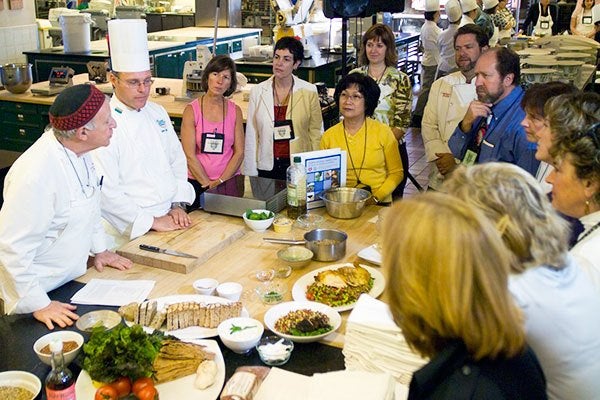With dramatic increases in obesity and diabetes, the search is on for innovative strategies to change the paths of those living with, or at risk for developing these and other lifestyle-related chronic diseases. In conjunction with good medical guidance, holistic strategies are needed that will improve the way people eat, move, and think.
Dr. David Eisenberg, Director of Culinary Nutrition at Harvard Chan’s Department of Nutrition, may have tapped into one winning strategy with Teaching Kitchens—a kind of cooking laboratory that combines culinary instruction using healthful whole ingredients, nutrition education, exercise, mindfulness, and personalized health coaching.
A new study by Eisenberg and colleagues, published in the American Journal of Lifestyle Medicine, assessed the implementation of the Teaching Kitchen concept in a workplace setting. Along with testing feasibility, researchers also aimed to determine if the Teaching Kitchen curriculum could favorably affect behaviors such as cooking confidence, dietary intake, exercise level, and mindful eating practices; as well as health markers like weight, waist circumference, blood pressure, and cholesterol levels. The curriculum used in the study was based on Healthy Kitchens, Healthy Lives (HKHL), an annual educational conference offered by the Harvard Chan School of Public Health and the Culinary Institute of America (CIA). Whereas HKHL is targeted at educating health professionals, this study included a more general population of office workers.
Two cohorts of 20 participants each were enrolled in the intervention for 14 or 16 weeks. These participants were all non-culinary CIA employees and their spouses, serving as proxies for employees at any self-insured organization. They participated in culinary demonstrations as well as hands-on culinary lessons and interactive lectures with discussion on nutrition, mindfulness, and movement. There were no restrictions on amount of food eaten. Participants also received access to a local gym and a personal activity-tracking device to increase their physical activity, and were matched with a professional health coach who provided 30-minute phone calls once a week throughout the duration of the study.
Compared with baseline measures, at the completion of the intervention there were statistically significant decreases in body weight, body mass index, waist circumference, systolic and diastolic blood pressure, and total cholesterol in both cohorts. [1] These changes persisted at one-year follow-up (among 32 of the original 40 participants), though only statistically significant decreases remained for waist circumference and diastolic blood pressure. Positive behavior changes were also observed, such as cooking meals from scratch at home more often, relying on ready-made meals less often, reading nutrition labels on purchased foods more often, and feeling more confident in cooking. However, these changes were not as apparent after 12 months, which may be due to lack of follow-up support after the 4-month intervention period.
Dr. Eisenberg describes the Teaching Kitchen as a learning lab for life skills.
“Participants learn which foods they should eat more of, or less of, and why. They learn the hands-on cooking techniques necessary to prepare almost any delicious, nutritious, easy to make, affordable recipe; they learn that movement and exercise are as important to optimal health as diet; they learn that being mindful is essential, when eating and in all aspects of living; and, perhaps most importantly, by exploring and working with a personal health coach, they learn why they want to change, and that they can use this newfound motivation to help them succeed at change.”
Eisenberg also said that for some study participants, many of these life-lessons may have been realized for the very first time. As one participant shared:
“I relate my story to Dorothy’s from the Wizard of Oz. She had her ‘red shoes’ the whole time, giving her the choice and ability to go home whenever she was ready. I too had the ‘red shoes,’ and this program showed me that I could make healthy living changes whenever I was ready.”
Results of this pilot study suggest that the Teaching Kitchen model is feasible, with 100% of participants completing the program. Feedback was positive about the inclusion of both lecture-style and hands-on learning in a group setting, as well as receiving access to a personal health coach. Furthermore, the study was able to measure relevant behavioral and clinical outcomes.
“Most Americans fall short of eating a healthy diet,” said Dr. Walter Willett, Professor of Epidemiology and Nutrition at the Harvard Chan School of Public Health, and co-author on the study. “The Teaching Kitchen concept is one way to help people prepare meals that may add years to their life while making every day more enjoyable.”
As Teaching Kitchens are being proposed and implemented across a range of organizations—including universities, hospitals, corporate worksites, and retirement communities—future explorations of the program may include tailoring the curriculum to different community and socioeconomic settings, and for various high and low-risk populations.
Reproducibility, scalability, and evaluation of Teaching Kitchen curricula will be explored by the Teaching Kitchen Collaborative (TKC)—a network of over 30 organizations with existing or planned teaching kitchens (details about the TKC and its current members can be found at: http://www.tkcollaborative.org/). The TKC was launched by Dr. Eisenberg and colleagues at the CIA and Harvard Chan’s Department of Nutrition in 2016.*
Related
- Q&A with Dr. David Eisenberg: On self-care skills, teaching kitchens & thinking outside of the box
- Twitter chat highlights benefits of “teaching kitchens” [Harvard Chan News]
- Doctors need more nutrition education [Harvard Chan News via PBS NewsHour]
- Teaching Patients About Healthy Lifestyle Behaviors: Communication is the First Step [Harvard Chan ECPE]
References
- Eisenberg, D.M., Righter, A.C., Matthews, B., Zhang, W., Willett, W.C, Massa, J. Feasibility Pilot Study of a Teaching Kitchen and Self-Care Curriculum in a Workplace Setting. Am J Lifestyle Med. 2017, May 23. First Published Online. DOI: 10.1177/1559827617709757.
*As of 2019, the TKC is an independent entity.
